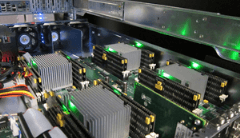Innovative phase-change data storage system demonstrated
on

A team from the University of California in San Diego recently demonstrated the first ever solid state storage system using phase-change memory (PCM), which is thousands of times faster than conventional hard drives and up to seven times faster than conventional solid-state drives (SSDs) using flash memory. PCM memory stores data by switching the alloy between crystalline and amorphous states by heating it with an electric current. To read the data, the chips use a smaller current to determine which state the chalcogenide is in.
The system, dubbed Moneta, was developed in the Computer Science and Engineering department at the UC San Diego Jacobs School of Engineering. It uses phase-change memory (PCM), a novel technology that stores data in the crystal structure of a metal alloy called a chalcogenide. Moneta marks the latest advancement in SSDs. Current SSDs use flash memory and are found in a wide range of electronics devices. Although faster than hard disk, flash memory is still too slow for modern data storage and analysis demands, particularly for high performance computing where the ability to sift through enormous volumes of data quickly is critical.
Moneta, which employs first-generation PCM chips from Micron Technology, can read large volumes of data at up to 1.1 GB/s and write data at up to 371 MB/s. With small volumes, such as 512 bytes, Moneta can read at 327 MB/s and write at 91 MB/s, which is 2 to 7 times faster than current flash-based SSDs. Moneta also provides shorter latency should reduce energy requirements for data-intensive applications.
Image: UCSD


Discussion (0 comments)